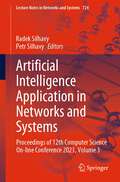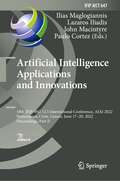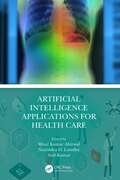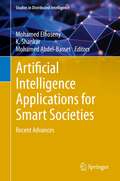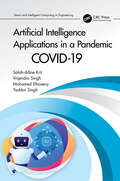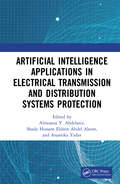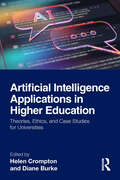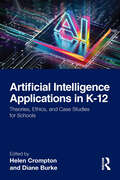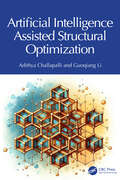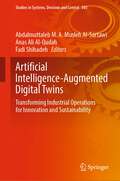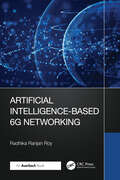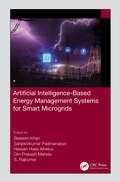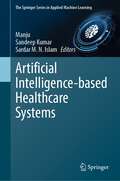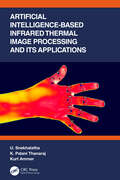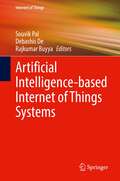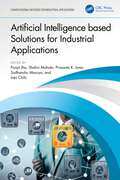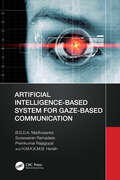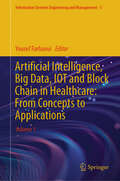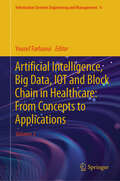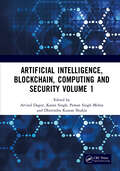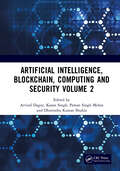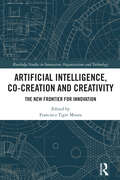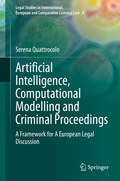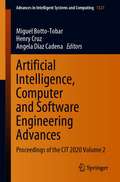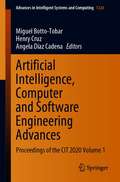- Table View
- List View
Artificial Intelligence Application in Networks and Systems: Proceedings of 12th Computer Science On-line Conference 2023, Volume 3 (Lecture Notes in Networks and Systems #724)
by Radek Silhavy Petr SilhavyThe application of artificial intelligence in networks and systems is a rapidly evolving field that has the potential to transform a wide range of industries. The refereed proceedings in this book is from the Artificial Intelligence Application in Networks and Systems session of the Computer Science Online Conference 2023 (CSOC 2023), which was held online in April 2023. The section brings together experts from different fields to present their research and discuss the latest trends and challenges. One of the key themes in this section is the development of intelligent systems that can learn, adapt, and optimize their performance in real time. Researchers are exploring how AI algorithms can be used to create autonomous networks and systems that can make decisions without human intervention. Furthermore, this section highlights the use of AI in improving network performance and efficiency. Researchers are exploring how AI algorithms can be used to optimize network routing, reduce congestion, and improve the quality of service. These efforts can help organizations save costs and improve user experience.
Artificial Intelligence Applications and Innovations: 18th IFIP WG 12.5 International Conference, AIAI 2022, Hersonissos, Crete, Greece, June 17–20, 2022, Proceedings, Part II (IFIP Advances in Information and Communication Technology #647)
by Ilias Maglogiannis Lazaros Iliadis John Macintyre Paulo CortezThis book constitutes the refereed proceedings of five International Workshops held as parallel events of the 18th IFIP WG 12.5 International Conference on Artificial Intelligence Applications and Innovations, AIAI 2022, virtually and in Hersonissos, Crete, Greece, in June 2022: the 11th Mining Humanistic Data Workshop (MHDW 2022); the 7th 5G-Putting Intelligence to the Network Edge Workshop (5G-PINE 2022); the 1st workshop on AI in Energy, Building and Micro-Grids (AIBMG 2022); the 1st Workshop/Special Session on Machine Learning and Big Data in Health Care (ML@HC 2022); and the 2nd Workshop on Artificial Intelligence in Biomedical Engineering and Informatics (AIBEI 2022). The 35 full papers presented at these workshops were carefully reviewed and selected from 74 submissions.
Artificial Intelligence Applications for Health Care
by Mitul Kumar Ahirwal Narendra D. Londhe Anil KumarThis book takes an interdisciplinary approach by covering topics on health care and artificial intelligence. Data sets related to biomedical signals (ECG, EEG, EMG) and images (X-rays, MRI, CT) are explored, analyzed, and processed through different computation intelligence methods. Applications of computational intelligence techniques like artificial and deep neural networks, swarm optimization, expert systems, decision support systems, clustering, and classification techniques on medial datasets are explained. Survey of medical signals, medial images, and computation intelligence methods are also provided in this book. Key Features Covers computational Intelligence techniques like artificial neural networks, deep neural networks, and optimization algorithms for Healthcare systems Provides easy understanding for concepts like signal and image filtering techniques Includes discussion over data preprocessing and classification problems Details studies with medical signal (ECG, EEG, EMG) and image (X-ray, FMRI, CT) datasets Describes evolution parameters such as accuracy, precision, and recall etc. This book is aimed at researchers and graduate students in medical signal and image processing, machine and deep learning, and healthcare technologies.
Artificial Intelligence Applications for Smart Societies: Recent Advances (Studies in Distributed Intelligence)
by Mohamed Elhoseny K. Shankar Mohamed Abdel-BassetThis volume discusses recent advances in Artificial Intelligence (AI) applications in smart, internet-connected societies, highlighting three key focus areas. The first focus is on intelligent sensing applications. This section details the integration of Wireless Sensing Networks (WSN) and the use of intelligent platforms for WSN applications in urban infrastructures, and discusses AI techniques on hardware and software systems such as machine learning, pattern recognition, expert systems, neural networks, genetic algorithms, and intelligent control in transportation and communications systems. The second focus is on AI-based Internet of Things (IoT) systems, which addresses applications in traffic management, medical health, smart homes and energy. Readers will also learn about how AI can extract useful information from Big Data in IoT systems. The third focus is on crowdsourcing (CS) and computing for smart cities. this section discusses how CS via GPS devices, GIS tools, traffic cameras, smart cards, smart phones and road deceleration devices enables citizens to collect and share data to make cities smart, and how these data can be applied to address urban issues including pollution, traffic congestion, public safety and increased energy consumption. This book will of interest to academics, researchers and students studying AI, cloud computing, IoT and crowdsourcing in urban applications.
Artificial Intelligence Applications in a Pandemic: COVID-19 (Smart and Intelligent Computing in Engineering)
by Salah-Ddine KritCOVID-19, a novel coronavirus pandemic has disrupted our society in many ways. Digital healthcare innovations are required more than ever before as we come across myriad challenges during this pandemic. Scientists and developers are learning and finding a way to use artificial intelligence applications and natural language processing to comprehend and tackle this disease. AI technologies are playing an important role in the response to the COVID-19 pandemic. Experts are using all possible tools to study the virus, diagnose individuals, and analyze the public health impacts. This book is a collection of some of the leading efforts related to AI and COVID-19 focused on finding how AI can be helpful in monitoring the situation from early warnings, swift emergency responses, and critical decision-making. It discusses the use of machine learning and how it may help to reduce the impacts of this pandemic in conjunction with all other research and strategies going on. The book serves as a technical resource of data analytics and AI applications in tracking infectious diseases. It will serve academics, students, data scientists, medical practitioners, and anybody managing a global pandemic. Features: Directs the attention to the smart digital healthcare system in this COVID-19 pandemic. Simulates novel investigations and how they will be beneficial in understanding the pandemic. Presents the latest ideas developed for data scientists, doctors, engineers, and economists. Analyses the various issues related to computing, AI apps, big data analytic techniques, and predictive scientific skill gaps. Explains some interesting and diverse types of challenges and data-driven healthcare applications.
Artificial Intelligence Applications in Electrical Transmission and Distribution Systems Protection
by Almoataz Y. AbdelazizArtificial intelligence (AI) can successfully help in solving real-world problems in power transmission and distribution systems because AI-based schemes are fast, adaptive, and robust and are applicable without any knowledge of the system parameters. This book considers the application of AI methods for the protection of different types and topologies of transmission and distribution lines. It explains the latest pattern-recognition-based methods as applicable to detection, classification, and location of a fault in the transmission and distribution lines, and to manage smart power systems including all the pertinent aspects. FEATURES Provides essential insight on uses of different AI techniques for pattern recognition, classification, prediction, and estimation, exclusive to power system protection issues Presents an introduction to enhanced electricity system analysis using decision-making tools Covers AI applications in different protective relaying functions Discusses issues and challenges in the protection of transmission and distribution systems Includes a dedicated chapter on case studies and applications This book is aimed at graduate students, researchers, and professionals in electrical power system protection, stability, and smart grids.
Artificial Intelligence Applications in Higher Education: Theories, Ethics, and Case Studies for Universities
by Helen Crompton Diane BurkeArtificial Intelligence Applications in Higher Education offers direct examples of how artificial intelligence systems can be applied in today’s higher education contexts. As the use of AI rapidly advances within colleges and universities worldwide, there is a pressing need to showcase the challenges, opportunities, and ethical considerations that are inherent in deploying these advanced computational tools. This book highlights the multifaceted roles of AI across teaching and learning, institutional administration, student data management, and beyond. Its collected case studies furnish actionable insights into enhancing academic institutions and addressing diverse learning priorities, such as motivation, engagement, feedback, and achievement goals. This valuable reference for researchers, designers, administrators, teaching faculty, and graduate students across various university programs offers fresh perspectives on generative AI, adaptive learning, intelligent tutoring systems, chatbots, predictive technologies, remote learning, and more.
Artificial Intelligence Applications in K-12: Theories, Ethics, and Case Studies for Schools
by Helen Crompton Diane BurkeArtificial Intelligence Applications in K-12 offers authentic instances of how AI systems can be integrated into K-12 education today. As AI technologies rapidly evolve and become more accessible to primary, middle, and high schools worldwide, there is a pressing need for new demonstrations that highlight the challenges, opportunities, and ethical considerations associated with these powerful tools. This book explores the various roles of AI within pedagogy and assessment, school administration, student data management, and beyond. Its collected case studies present practical ideas for enhancing educational institutions and offer replicable approaches across a range of learning priorities, from fostering motivation and engagement to improving feedback and achieving educational goals. Researchers, faculty members of teacher and leadership preparation programs, curriculum and instruction specialists, school-based instructional designers, technology coaches, and other readers will gain fresh insights from diverse global perspectives on topics such as generative AI, adaptive learning, intelligent tutoring systems, chatbots, predictive technologies, facial recognition software, and more.
Artificial Intelligence Assisted Structural Optimization
by Adithya Challapalli Guoqiang LiArtificial Intelligence Assisted Structural Optimization explores the use of machine learning and correlation analysis within the forward design and inverse design frameworks to design and optimize lightweight load-bearing structures as well as mechanical metamaterials.Discussing both machine learning and design analysis in detail, this book enables readers to optimize their designs using a data-driven approach. This book discusses the basics of the materials utilized, for example, shape memory polymers, and the manufacturing approach employed, such as 3D or 4D printing. Additionally, the book discusses the use of forward design and inverse design frameworks to discover novel lattice unit cells and thin-walled cellular unit cells with enhanced mechanical and functional properties such as increased mechanical strength, heightened natural frequency, strengthened impact tolerance, and improved recovery stress. Inverse design methodologies using generative adversarial networks are proposed to further investigate and improve these structures. Detailed discussions on fingerprinting approaches, machine learning models, structure screening techniques, and typical Python codes are provided in the book.The book provides detailed guidance for both students and industry engineers to optimize their structural designs using machine learning.
Artificial Intelligence-Augmented Digital Twins: Transforming Industrial Operations for Innovation and Sustainability (Studies in Systems, Decision and Control #503)
by Abdalmuttaleb M. A. Musleh Al-Sartawi Anas Ali Al-Qudah Fadi ShihadehPresently, we stand on the threshold of a technological revolution that will drastically change the way we live, work, and communicate with each other. By the current rate, scope, and complexity, this transformation will be as fundamental for society as any other technological paradigm change from the past. The industries which are more susceptible to change are technologically oriented industries including banking, finance, accounting, and auditing. One of the technological concepts of the technological revolution is the concept of the digital twin.The application of digital twins and AI as paired with Internet of Things technologies makes it possible to solve ESG problems on a completely different level (Li, 2019) for accounting firms and financial institutions. These include recycling on demand, rational energy consumption, smart surveillance cameras for crime tracking, and smart branch parking solutions, monitoring the wear and tear and conditions of financial technology infrastructures.Moreover, numerous researchers and practitioners emphasize the significance of innovating sustainable business models and operations (Geissdoerfer et al., 2018). The digital twin will allow businesses and financial institutions to minimize costs, boost customer service, and find new ways to generate revenue. DTW is accessible now more than ever, and many reputable and innovative companies such as Tesla, Ericsson, and Siemens have adopted it with varying success.Therefore, this book examines the opportunities, challenges, and risks of artificial intelligence-augmented digital twins for financial operations, innovation, and sustainable development. It focuses on AI and digital twin technologies to furnish solutions for the current industrial revolution including the Metaverse. Henceforth, this book aims to encourage authors to submit multi-disciplinary chapters indicating the current scholarly challenges about the applications and potential of artificial intelligence and digital twins in accounting, finance, and banking.
Artificial Intelligence-Based 6G Networking
by Radhika Ranjan RoyArtificial Intelligence-Based 6G Networking focuses exclusively on the upcoming sixth-generation (6G) network and services slated for implementation by 2030. It explores the paradigm shift that is 6G. It discusses the deep integration of computing and communication, supported by artificial intelligence (AI) across network elements like cloud, edge, and terminals. It also examines how AI-native interfaces will permeate various network components, from radio access networks to application servers and databases.Proposing a unified AI-enabled framework for optimizing networks and applications as a single integrated system, the book covers how network service providers can tailor network baselines, reduce noise, and accurately identify issues. The book delves into the potential of AI-driven networks to self-correct, predict, and rectify service degradations proactively, enhancing uptime and troubleshooting efficiency. It outlines the “Connection, Communication, Collaboration, Curation, and Community” framework to enhance network effects, aiding operators in automation, cost reduction, and providing optimal user experiences.Covering topics from MIMO and Massive MIMO to holographic communications, cybersecurity and quantum communications, the book explores cutting-edge technologies shaping the future of 6G networks. It anticipates a future where AI, along with machine learning and deep learning, enables continuous learning, self-optimization, and predictive maintenance, even with full automation, that will be the hallmark of a new era in network connectivity and innovation.
Artificial Intelligence-Based Energy Management Systems for Smart Microgrids
by Baseem KhanModeling and optimization of energy management systems for micro- and mini-grids play an important role in the fields of energy generation dispatch, system operation, protection coordination, power quality issues, and peak demand conflict with grid security. This comprehensive reference text provides an in-depth insight into these topics. This text discusses the use of meta-heuristic and artificial intelligence algorithms for developing energy management systems with energy use prediction for mini- and microgrid systems. It covers important concepts including modeling of microgrid and energy management systems, optimal protection coordination-based microgrid energy management, optimal energy dispatch with energy management systems, and peak demand management with energy management systems. Key Features: Presents a comprehensive discussion of mini- and microgrid concepts Discusses AC and DC microgrid modeling in detail Covers optimization of mini- and microgrid systems using AI and meta-heuristic techniques Provides MATLAB®-based simulations on a mini- and microgrid Comprehensively discussing concepts of microgrids with the help of software-based simulations, this text will be useful as a reference text for graduate students and professionals in the fields of electrical engineering, electronics and communication engineering, renewable energy, and clean technology.
Artificial Intelligence-based Healthcare Systems (The Springer Series in Applied Machine Learning)
by Manju Sandeep Kumar Sardar M. N. IslamThis book explores new applications in the field of science and technology for healthcare systems. The main focus of this book is to devise smart, efficient and robust solutions for the health care sector to serve the major population of rural areas. Artificial Intelligence-based Healthcare Systems encourages scientists, engineers, and scholars across the multiple disciplines to design smart intelligent innovations on rural healthcare issues and motivate to collaborate multiple ideas to design best solutions. It also helps the readers at various levels of knowledge to further enhance their understanding for new tools and smart solutions.
Artificial Intelligence-based Infrared Thermal Image Processing and its Applications
by U. Snekhalatha K. Palani Thanaraj Kurt AmmerInfrared thermography is a fast and non-invasive technology that provides a map of the temperature distribution on the body’s surface. This book provides a description of designing and developing a computer-assisted diagnosis (CAD) system based on thermography for diagnosing such common ailments as rheumatoid arthritis (RA), diabetes complications, and fever. It also introduces applications of machine-learning and deep-learning methods in the development of CAD systems. Key Features: • Covers applications of various image processing techniques in thermal imaging applications for the diagnosis of different medical conditions • Describes the development of a computer diagnostics system (CAD) based on thermographic data • Discusses deep-learning models for accurate diagnosis of various diseases • Includes new aspects in rheumatoid arthritis and diabetes research using advanced analytical tools • Reviews application of feature fusion algorithms and feature reduction algorithms for accurate classification of images This book is aimed at researchers and graduate students in biomedical engineering, medicine, image processing, and CAD.
Artificial Intelligence-based Internet of Things Systems (Internet of Things)
by Debashis De Rajkumar Buyya Souvik PalThe book discusses the evolution of future generation technologies through Internet of Things (IoT) in the scope of Artificial Intelligence (AI). The main focus of this volume is to bring all the related technologies in a single platform, so that undergraduate and postgraduate students, researchers, academicians, and industry people can easily understand the AI algorithms, machine learning algorithms, and learning analytics in IoT-enabled technologies. This book uses data and network engineering and intelligent decision support system-by-design principles to design a reliable AI-enabled IoT ecosystem and to implement cyber-physical pervasive infrastructure solutions. This book brings together some of the top IoT-enabled AI experts throughout the world who contribute their knowledge regarding different IoT-based technology aspects.
Artificial Intelligence based Solutions for Industrial Applications (Computational Methods for Industrial Applications)
by Pooja Jha Shalini Mahato Prasanta K. Jana Sudhanshu Maurya Ines ChihiArtificial Intelligence based Solutions for Industrial Applications aims to examine the utilization of artificial intelligence (AI) technologies to tackle difficult industrial issues and offers readers a thorough understanding of how these technologies are being employed to address intricate industrial challenges and to stimulate innovation. This book explores the fundamental principles of artificial intelligence (AI) and its practical use in industrial environments. This book improves understanding of core concepts, the present state of the art and real-time implementation of AI in many industrial applications. This book describes the detailed implementation of AI in the industrial sector as well as related case studies for in-depth understanding. Basic concepts, related work reviews, illustrations, empirical results, and tables are integrated within each chapter to give the readers the opportunity to gain maximum knowledge and to easily understand the methodology and results presented.This book introduces a variety of smart algorithms to help in filtering important information and to solve problems in the application domains. Application of machine learning and deep learning in the industry demonstrates the capabilities by which it may be used to solve practical problems in the 'Fourth Industrial Revolution', and it equips readers with the necessary knowledge and tools to design solutions by themselves with the help of theory and practical examples dealt with. The fourth industrial revolution and its consequences on society and organizations are discussed in this book.Features: Detailed understanding of the industrial application of AI. Discussion of core concepts of different machine learning and deep learning techniques such as artificial neural networks, support vector machines, K –nearest neighbour, decision tree, logistic regression, and many more. Detailed study on various industrial applications of machine learning and deep learning in healthcare, education, entertainment, share market, manufacturing, and many more. Case studies on industrial application of AI Summataion of the fourth industrial revolution and its consquences on society and organizations. This book is primarily written for graduate students, engineers, and academic researchers, industrial practitioners, and anyone who wants to optimize production processes, explore AI technology, or stay ahead in the industrial field. It covers the complexities of AI in industrial contexts from core basic understanding to complex implementation.
Artificial Intelligence-Based System for Gaze-Based Communication
by B.G.D.A. Madhusanka Sureswaran Ramadass Premkumar Rajagopal H.M.K.K.M.B. HerathThis book focuses on the artificial neural network-based system for gaze-based communication. It covers the feasible and practical collaboration of human–computer interaction (HCI) in which a user can intuitively express tasks using gaze-based communication. It will target the vast applications of gaze-based communication using computer vision, image processing, and artificial intelligence.Artificial Intelligence-Based System for Gaze-Based Communication introduces a novel method to recognize the implicit intention of users by using nonverbal communication in combination with computer vision technologies. A novel HCI framework is developed to enable implicit and intuitive gaze-based intention communications. This framework allows the users to intuitively express their intention using natural gaze cues. The book also focuses on robot caregiving technology, which can understand the user’s intentions using minimal interactions with the user. The authors examine gaze-based tracking applications for the assisted living of elderly people. The book examines detailed applications of eye-gaze communication for real-life problems. It also examines the advantages that most people can handle gaze-based communications because it requires very little effort, and most of the elderly and impaired can retain visual capability.This book is ideally designed for students, researchers, academicians, and professionals interested in exploring and implementing gaze-based communication strategies and those working in the field of computer vision and image processing.
Artificial Intelligence, Big Data, IOT and Block Chain in Healthcare: Volume 1 (Information Systems Engineering and Management #5)
by Yousef FarhaouiThis book covers a wide range of topics related to the integration of Artificial Intelligence, Big Data, IoT, and Blockchain: From Concepts to Applications. It begins by establishing a solid foundation and introducing the concepts and principles of each technology. The subsequent chapters delve into the various applications and use cases, providing readers with real-world examples of how AI, IoT, and Blockchain can be leveraged to address key challenges in Smart Environments. Data is becoming an increasingly decisive resource in modern societies, economies, and governmental organizations. Data science, Artificial Intelligence, and Smart Environments inspire novel techniques and theories drawn from mathematics, statistics, information theory, computer science, and social science. This book reviews the state of the art of big data analysis, Artificial Intelligence, and Smart Environments. It includes issues that pertain to signal processing, probability models, machine learning, data mining, databases, data engineering, pattern recognition, visualization, predictive analytics, data warehousing, data compression, computer programming, smart city, etc. The papers in this book were the outcome of research conducted in this field of study. The latter makes use of applications and techniques related to data analysis in general and big data and smart cities in particular. The authors hope that this book serves as a valuable resource and guide for readers, empowering them to navigate the intricate landscape of Artificial Intelligence, IoT, and Blockchain in Smart Environments. Let the authors embark on this transformative journey together, as the authors explore the concepts and applications that hold the potential to shape the future of Smart Environments. The book appeals to advanced undergraduate and graduate students, post-doctoral researchers, lecturers, and industrial researchers, as well as anyone interested in big data analysis and Artificial Intelligence.
Artificial Intelligence, Big Data, IOT and Block Chain in Healthcare: Volume 2 (Information Systems Engineering and Management #6)
by Yousef FarhaouiThis book covers a wide range of topics related to the integration of Artificial Intelligence, Big Data, IoT, and Blockchain: From Concepts to Applications. It begins by establishing a solid foundation and introducing the concepts and principles of each technology. The subsequent chapters delve into the various applications and use cases, providing readers with real-world examples of how AI, IoT, and Blockchain can be leveraged to address key challenges in Smart Environments. Data is becoming an increasingly decisive resource in modern societies, economies, and governmental organizations. Data science, Artificial Intelligence, and Smart Environments inspire novel techniques and theories drawn from mathematics, statistics, information theory, computer science, and social science. This book reviews the state of the art of big data analysis, Artificial Intelligence, and Smart Environments. It includes issues that pertain to signal processing, probability models, machine learning, data mining, databases, data engineering, pattern recognition, visualization, predictive analytics, data warehousing, data compression, computer programming, smart city, etc. The papers in this book were the outcome of research conducted in this field of study. The latter makes use of applications and techniques related to data analysis in general and big data and smart cities in particular. The authors hope that this book serves as a valuable resource and guide for readers, empowering them to navigate the intricate landscape of Artificial Intelligence, IoT, and Blockchain in Smart Environments. Let the authors embark on this transformative journey together, as the authors explore the concepts and applications that hold the potential to shape the future of Smart Environments. The book appeals to advanced undergraduate and graduate students, post-doctoral researchers, lecturers, and industrial researchers, as well as anyone interested in big data analysis and Artificial Intelligence.
Artificial Intelligence, Blockchain, Computing and Security Volume 1: Proceedings of the International Conference on Artificial Intelligence, Blockchain, Computing and Security (ICABCS 2023), Gr. Noida, UP, India, 24 - 25 February 2023
by Arvind Dagur Karan Singh Pawan Singh Mehra Dhirendra Kumar ShuklaThis book contains the conference proceedings of ICABCS 2023, a non-profit conference with the objective to provide a platform that allows academicians, researchers, scholars and students from various institutions, universities and industries in India and abroad to exchange their research and innovative ideas in the field of Artificial Intelligence, Blockchain, Computing and Security. It explores the recent advancement in field of Artificial Intelligence, Blockchain, Communication and Security in this digital era for novice to profound knowledge about cutting edges in artificial intelligence, financial, secure transaction, monitoring, real time assistance and security for advanced stage learners/ researchers/ academicians. The key features of this book are: Broad knowledge and research trends in artificial intelligence and blockchain with security and their role in smart living assistance Depiction of system model and architecture for clear picture of AI in real life Discussion on the role of Artificial Intelligence and Blockchain in various real-life problems across sectors including banking, healthcare, navigation, communication, security Explanation of the challenges and opportunities in AI and Blockchain based healthcare, education, banking, and related industries This book will be of great interest to researchers, academicians, undergraduate students, postgraduate students, research scholars, industry professionals, technologists, and entrepreneurs.
Artificial Intelligence, Blockchain, Computing and Security Volume 2: Proceedings of the International Conference on Artificial Intelligence, Blockchain, Computing and Security (ICABCS 2023), Gr. Noida, UP, India, 24 - 25 February 2023
by Arvind Dagur Karan Singh Pawan Singh Mehra Dhirendra Kumar ShuklaThis book contains the conference proceedings of ICABCS 2023, a non-profit conference with the objective to provide a platform that allows academicians, researchers, scholars and students from various institutions, universities and industries in India and abroad to exchange their research and innovative ideas in the field of Artificial Intelligence, Blockchain, Computing and Security. It explores the recent advancement in field of Artificial Intelligence, Blockchain, Communication and Security in this digital era for novice to profound knowledge about cutting edges in artificial intelligence, financial, secure transaction, monitoring, real time assistance and security for advanced stage learners/ researchers/ academicians. The key features of this book are: Broad knowledge and research trends in artificial intelligence and blockchain with security and their role in smart living assistance Depiction of system model and architecture for clear picture of AI in real life Discussion on the role of Artificial Intelligence and Blockchain in various real-life problems across sectors including banking, healthcare, navigation, communication, security Explanation of the challenges and opportunities in AI and Blockchain based healthcare, education, banking, and related industries This book will be of great interest to researchers, academicians, undergraduate students, postgraduate students, research scholars, industry professionals, technologists, and entrepreneurs.
Artificial Intelligence, Co-Creation and Creativity: The New Frontier for Innovation (Routledge Studies in Innovation, Organizations and Technology)
by Francisco Tigre MouraArtificial intelligence (AI) has deeply impacted our understanding of creativity and the human ability to generate creative outputs. New applications for creative tasks are rapidly evolving, and new tools are constantly being developed with much greater optimal capabilities. Importantly, the success of implementing such tools for creative tasks is still heavily dependent on human supervision and input. Therefore, it is vital to understand and critically reflect on the nature of co-creative processes between humans and AI. This book addresses such issues and provides insights into how humans can augment their capabilities for generating creative and innovative outputs by successfully co-creating with AI.The book is intentionally divided into three main parts to allow for a comprehensive and holistic perspective on human and AI co-creation for creative tasks. The sections are divided as follows: Part 1: “Principles of AI and Creativity”, Part 2: “Critical Issues on Artificial Co-Creation”, and Part 3: “Industry-Specific Discussions”.Consequently, the book provides a holistic insight on the topic, covering various issues and perspectives and enabling an accessible read to a broad audience. For example, chapters cover examples across different industry sectors, including music, arts, science, and management. Furthermore, the book covers critical questions involving copyrights, ethical concerns, relationship with algorithms, and context-based issues. Only by critically reflecting on the intrinsic issues of AI and learning how to work with it effectively for creative purposes will we be able to benefit from its full potential to augment human creative abilities in an appropriate manner.This novel, edited collection is an essential read for scholars working on the intersection of AI, creativity, arts, and management.
Artificial Intelligence, Computational Modelling and Criminal Proceedings: A Framework for A European Legal Discussion (Legal Studies in International, European and Comparative Criminal Law #4)
by Serena QuattrocoloThis book discusses issues relating to the application of AI and computational modelling in criminal proceedings from a European perspective. Part one provides a definition of the topics. Rather than focusing on policing or prevention of crime – largely tackled by recent literature – it explores ways in which AI can affect the investigation and adjudication of crime. There are two main areas of application: the first is evidence gathering, which is addressed in Part two. This section examines how traditional evidentiary law is affected by both new ways of investigation – based on automated processes (often using machine learning) – and new kinds of evidence, automatically generated by AI instruments. Drawing on the comprehensive case law of the European Court of Human Rights, it also presents reflections on the reliability and, ultimately, the admissibility of such evidence. Part three investigates the second application area: judicial decision-making, providing an unbiased review of the meaning, benefits, and possible long-term effects of ‘predictive justice’ in the criminal field. It highlights the prediction of both violent behaviour, or recidivism, and future court decisions, based on precedents. Touching on the foundations of common law and civil law traditions, the book offers insights into the usefulness of ‘prediction’ in criminal proceedings.
Artificial Intelligence, Computer and Software Engineering Advances: Proceedings of the CIT 2020 Volume 2 (Advances in Intelligent Systems and Computing #1327)
by Miguel Botto-Tobar Henry Cruz Angela Díaz CadenaThis book constitutes the proceedings of the XV Multidisciplinary International Congress on Science and Technology (CIT 2020), held in Quito, Ecuador, on 26–30 October 2020, proudly organized by Universidad de las Fuerzas Armadas ESPE in collaboration with GDEON. CIT is an international event with a multidisciplinary approach that promotes the dissemination of advances in Science and Technology research through the presentation of keynote conferences. In CIT, theoretical, technical, or application works that are research products are presented to discuss and debate ideas, experiences, and challenges. Presenting high-quality, peer-reviewed papers, the book discusses the following topics:Artificial IntelligenceComputational ModelingData CommunicationsDefense EngineeringInnovation, Technology, and SocietyManaging Technology & Sustained Innovation, and Business DevelopmentModern Vehicle TechnologySecurity and CryptographySoftware Engineering
Artificial Intelligence, Computer and Software Engineering Advances: Proceedings of the CIT 2020 Volume 1 (Advances in Intelligent Systems and Computing #1326)
by Miguel Botto-Tobar Henry Cruz Angela Díaz CadenaThis book constitutes the proceedings of the XV Multidisciplinary International Congress on Science and Technology (CIT 2020), held in Quito, Ecuador, on 26–30 October 2020, proudly organized by Universidad de las Fuerzas Armadas ESPE in collaboration with GDEON. CIT is an international event with a multidisciplinary approach that promotes the dissemination of advances in Science and Technology research through the presentation of keynote conferences. In CIT, theoretical, technical, or application works that are research products are presented to discuss and debate ideas, experiences, and challenges. Presenting high-quality, peer-reviewed papers, the book discusses the following topics:Artificial IntelligenceComputational ModelingData CommunicationsDefense EngineeringInnovation, Technology, and SocietyManaging Technology & Sustained Innovation, and Business DevelopmentModern Vehicle TechnologySecurity and CryptographySoftware Engineering
